These people still work at the university itself
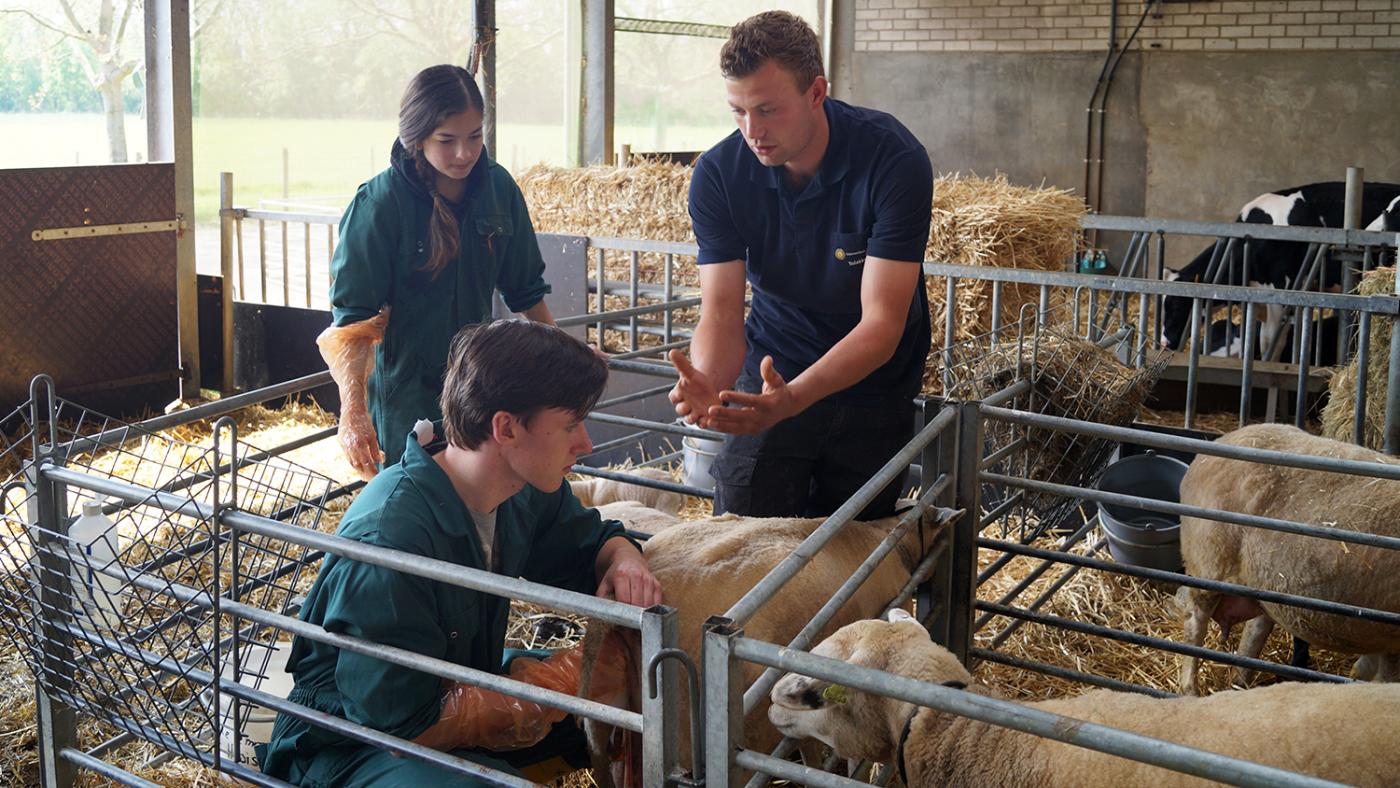
Niek van Bokhorst (35) and Said Maatougui (49), front officers goods delivery point
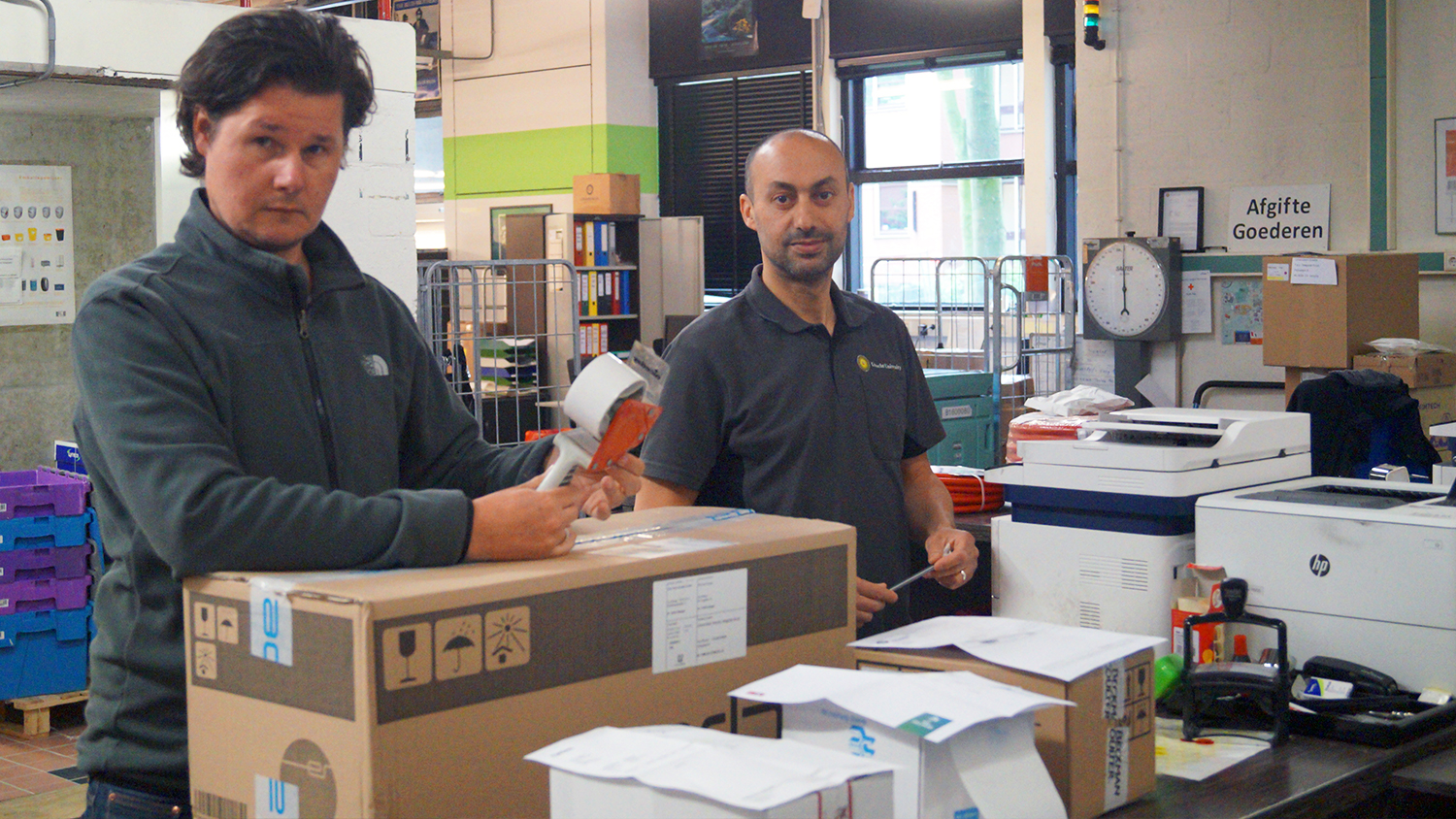
What type of work do you do?
“We work in the central incoming goods department in the Kruyt building. We receive all incoming packages for the entire university. We check who the package is for, and ensure it ends up with the right person. We also fill the nitrogen tanks that are needed for research, and we have storage room with dry ice. That ensures that research samples can be safely stored and sent.”
How different is your work now compared to normal times?
“We receive significantly fewer packages than usual. Our colleagues do still make their delivery rounds, but most of the buildings are empty. Some people stop by to pick up their packages. We’re now working in shifts with two people – fewer than normal. And we work fewer days than we usually do.”
What would happen if no one was here?
“That’s obvious. Not a single package would be delivered within the university. We still regularly see people from the mail services, and suppliers. We also make sure things end up with the right people, and that wouldn’t be possible anymore.”
How does it feel to be here, and what do you do to stay safe from corona?
“For us, working is kind of an outing. We work two days of the week, and at home, you’ve got the children with you. Here, you can have a chat, and do some good. There are indeed numerous measures that were taken to prevent corona. We sign in when we start work, we keep 1.5 metre distance, and we constantly wash our hands. We’re not afraid of corona. Both of us suspect we’ve already had corona. Both we have been quite sick. But we didn’t get tested.”
Mariet Hefting (52), associate professor Ecology and Biodiversity
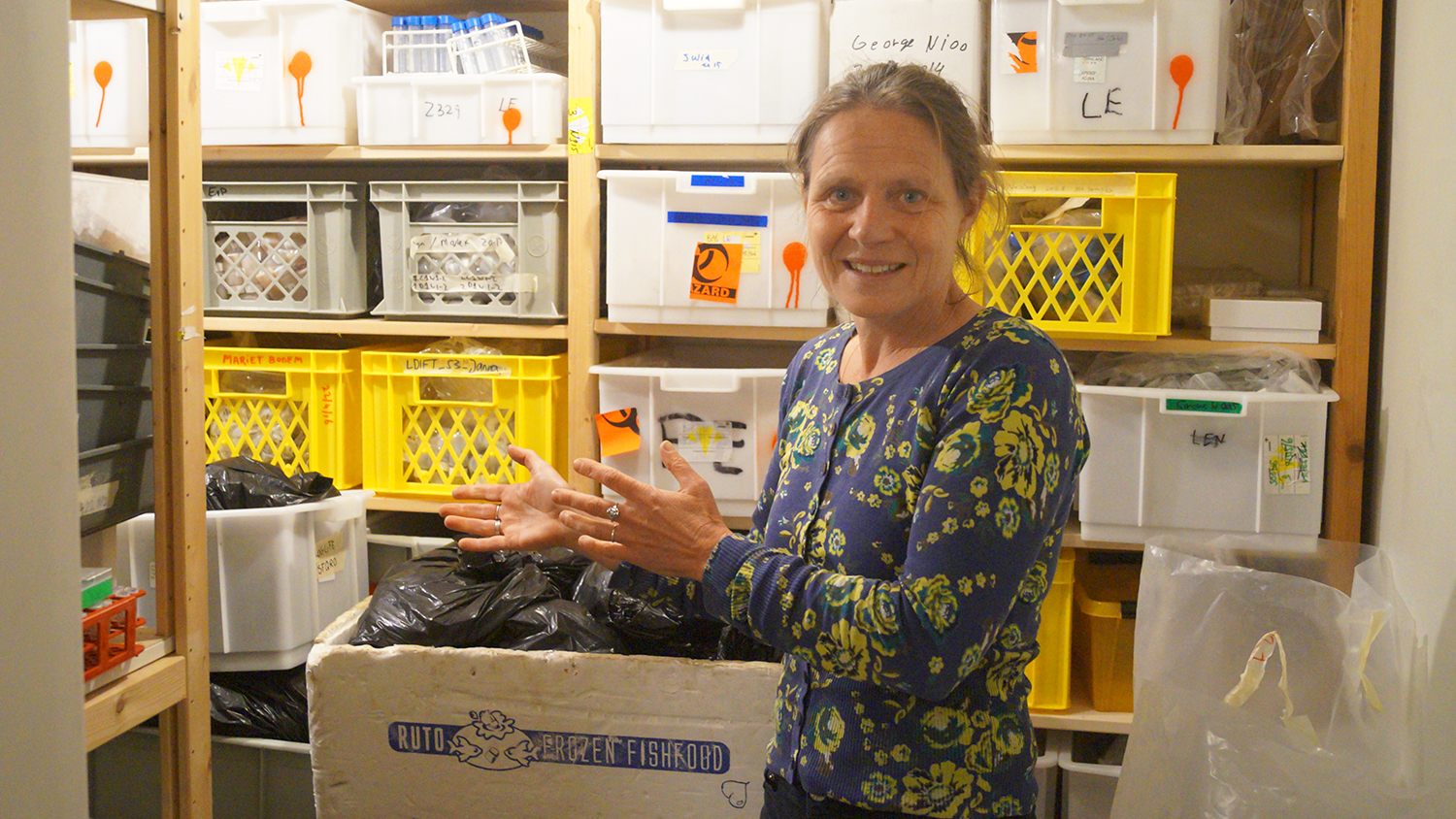
What type of work do you do?
“I teach several courses and supervise students who work on their Bachelor’s or Master’s theses. I’m also a researcher, involved in several research projects. One example is Loglife, in which we study the decay of 27 types of wood. That’s a long-term project in which we study tree trunks to find out how the wood decays throughout time, in order to better understand the process and to improve the substantiation of the climate models for carbon sequestration. We also look at the biodiversity of the fungi, bacteria, moss, and benthic fauna that are involved in the decay – in other words, how dead wood brings forth new life. I’m also active in a national project with several universities, in which we study water management in peatlands. I’m also active in the project BioClive, which studies ecosystems of the future.”
How different is your work now compared to normal times?
“Most of the time, we work from home now. Online teaching is rather intensive. In our research, we’ve had to postpone some of the projects because we can’t access the laboratories. But sometimes, it’s necessary to be here. For the BioClive project, for example, plants need to be watered. We’ve made a schedule for that. This week, I was here for Loglife. One of the freezers the samples are kept in had to be renovated. So I had to move all the samples – which have been here for eight years – to a different freezer. Today, I’m here to prepare fieldwork for the project in the peatlands.”
What would happen if no one was here?
“We’ve already looked at our tasks critically and postponed a lot of research. But the Loglife project has been running for eight years, so you have to ensure it can continue. If those samples aren’t moved, many years of research would be lost. If we don’t do our fieldwork next week, we wouldn’t be in step with other universities and we can no longer link our results to each other. It turns out that in other places, they’ve continued the research.”
How does it feel to be here, and what do you do to stay safe from corona?
“It’s very special and a little bit strange, being here again. I had a virtual meeting and the colleagues immediately saw that I was working in the Kruyt building. They instantly commented on it. Of course, we’re very careful, and we’re following all the rules.”
Koen Slagboom (22), animal caretaker at De Tolakker
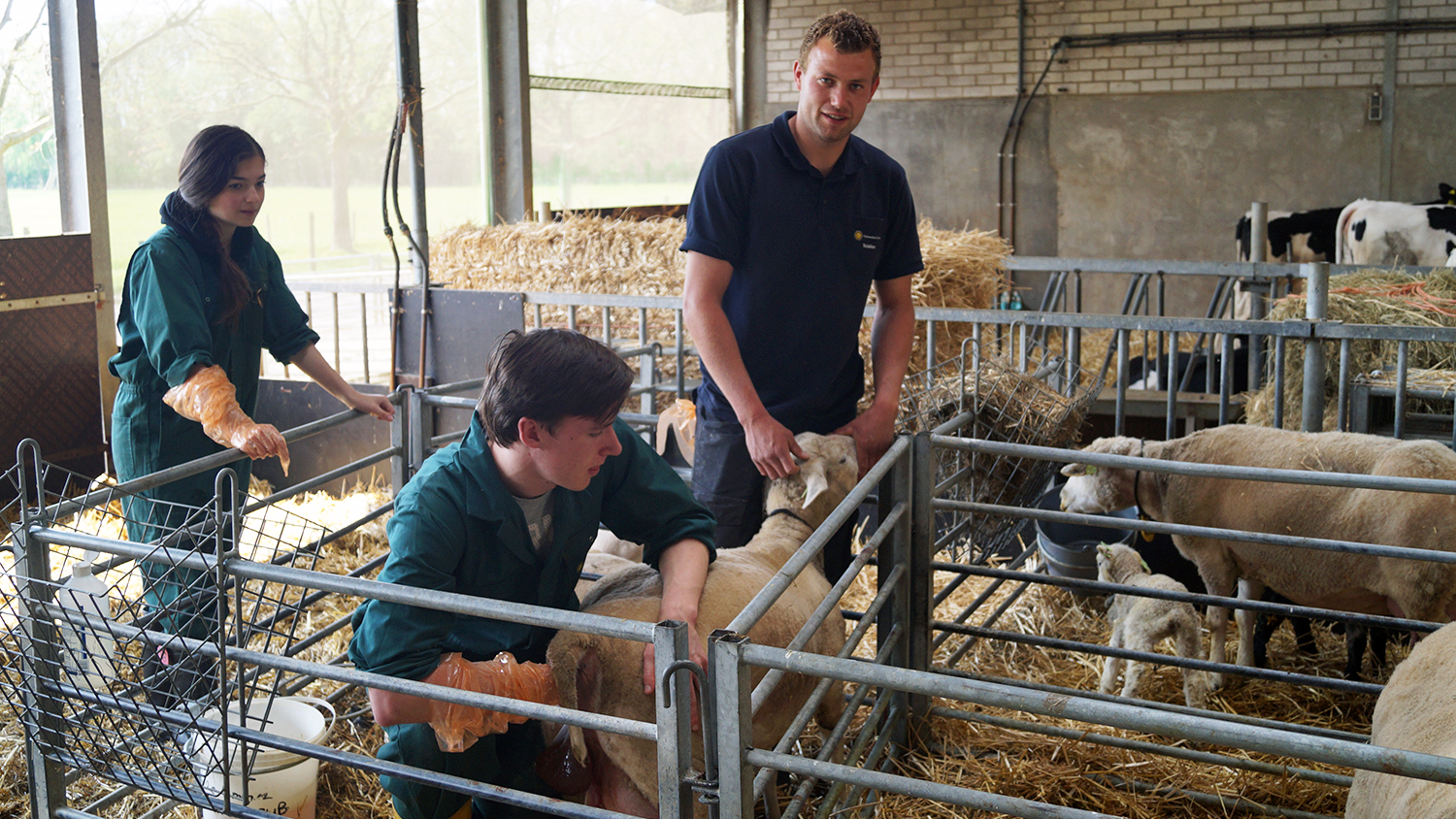
What type of work do you do?
“I’m an animal caretaker at the educational farm De Tolakker. This is a mixed livestock farm that’s part of Utrecht University. It’s a place where students can gain practical experience. I myself mainly work with the sheep, but also help out with other animals, like the cows. Aside from caring for the animals, I also supervise students. Today, several sheep will give birth to lambs. I help the first-year students who’ve signed up to help with the lambs’ births.”
How different is your work now compared to normal times?
“For us, many things are still the same. Work at the farm continues as normal, and we care for the animals every day as usual. We have fewer students coming in than we usually do, but for things like the ewes giving birth, they’re welcome to come in and gain experience.”
What would happen if no one was here?
“There’s no way to work at a farm remotely, of course. The animals are here and need care.”
How does it feel to be here, and what do you do to stay safe from corona?
“I’m happy I can work here, and love doing so. We do try to follow the rules for preventing corona as much as possible. But with a sheep giving birth, there’s no way to keep 1.5 metre distance.”
Patrick Helder (34), security officer
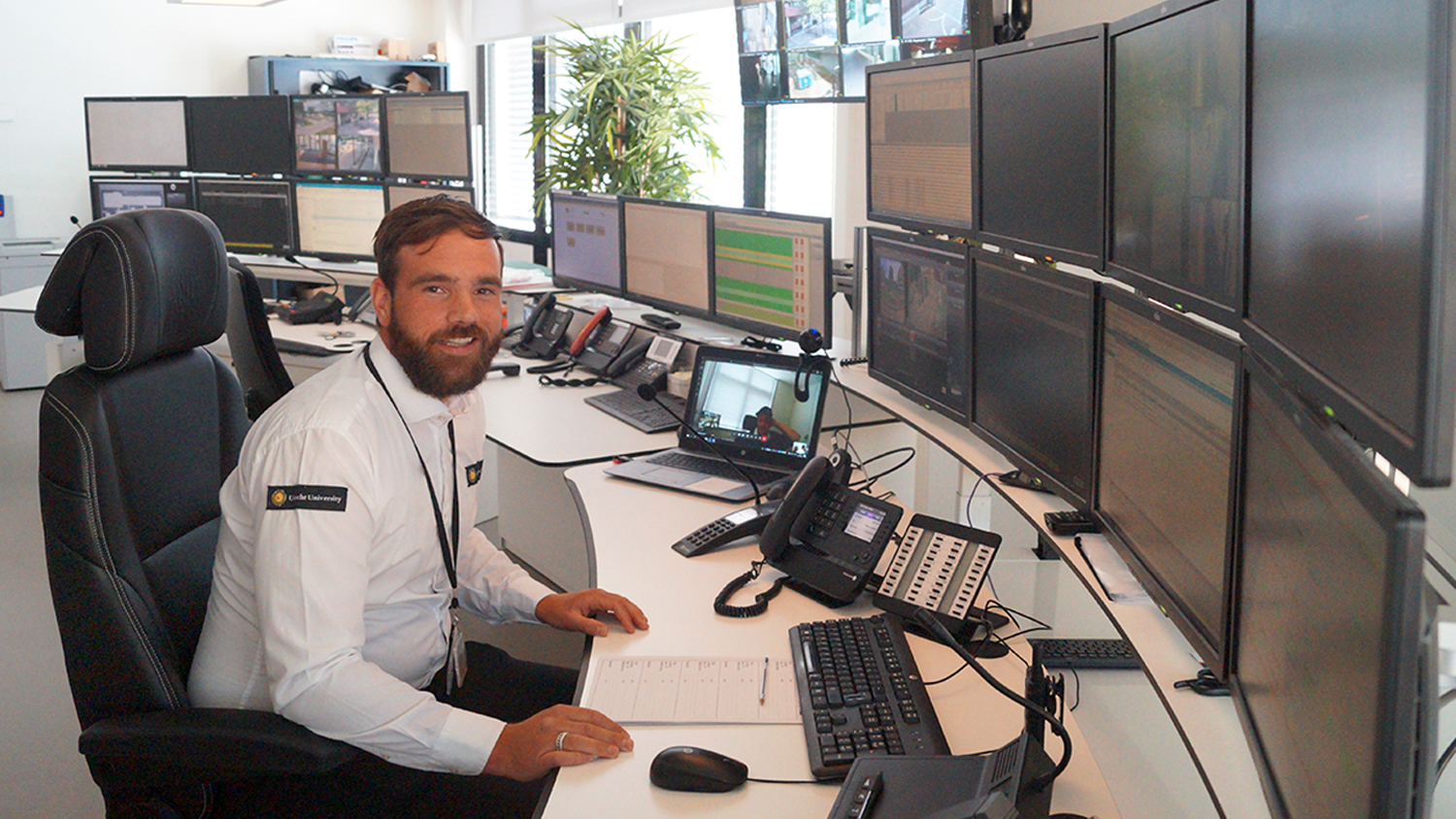
What type of work do you do?
“I’m senior security officer and coordinate the current security tasks at the UU. We’re here in a monitoring station, where we’ve got an overview of all the university buildings. We also have a field service, who makes rounds. We’re responsible for the security 24 hours a day.”
How different is your work now compared to normal times?
“It’s usually very busy at the Utrecht Science Park. Now, 80 percent of the buildings are closed, and the atmosphere is very different. For security, that means we’re working in a different way as well. There’s no social control, so we have to keep a close eye on all buildings. You want to prevent incidents, although we did have to deal with a break-in at the Kruyt building recently. Another new thing is that when we do rounds, for instance at the International Campus, we’ve got the new task of talking to the students there and pointing out when they’re sitting too close to each other, and that they have to follow the rules.”
What would happen if no one was here?
“You can’t do security at a distance. You wouldn’t have any control. You have to be right there, and you have to be able to act immediately when necessary, for instance when an alarm sounds. But also when someone’s in a parking garage and can’t get out, or making the buildings accessible to companies coming in for maintenance. Those are also times when our help is needed.”
How does it feel to be here, and what do you do to stay safe from corona?
“Personally, I’m happy that I get to work here. At home, we have kids, and my wife is heavily pregnant. Some variety is good. We’re doing a lot to prevent corona here. We’ve got essential jobs, and it would be very bad indeed if team members were to get sick, so we’ve got to prevent that. For example, in the entrance hall, where you come in, only one person is allowed. There’s usually two of us at the monitoring station. Now, there’s one person in the city centre, and one at the Utrecht Science Park. We do have an open connection with each other at all times, and can see everything
Eric de Keijzer (61), IT officer
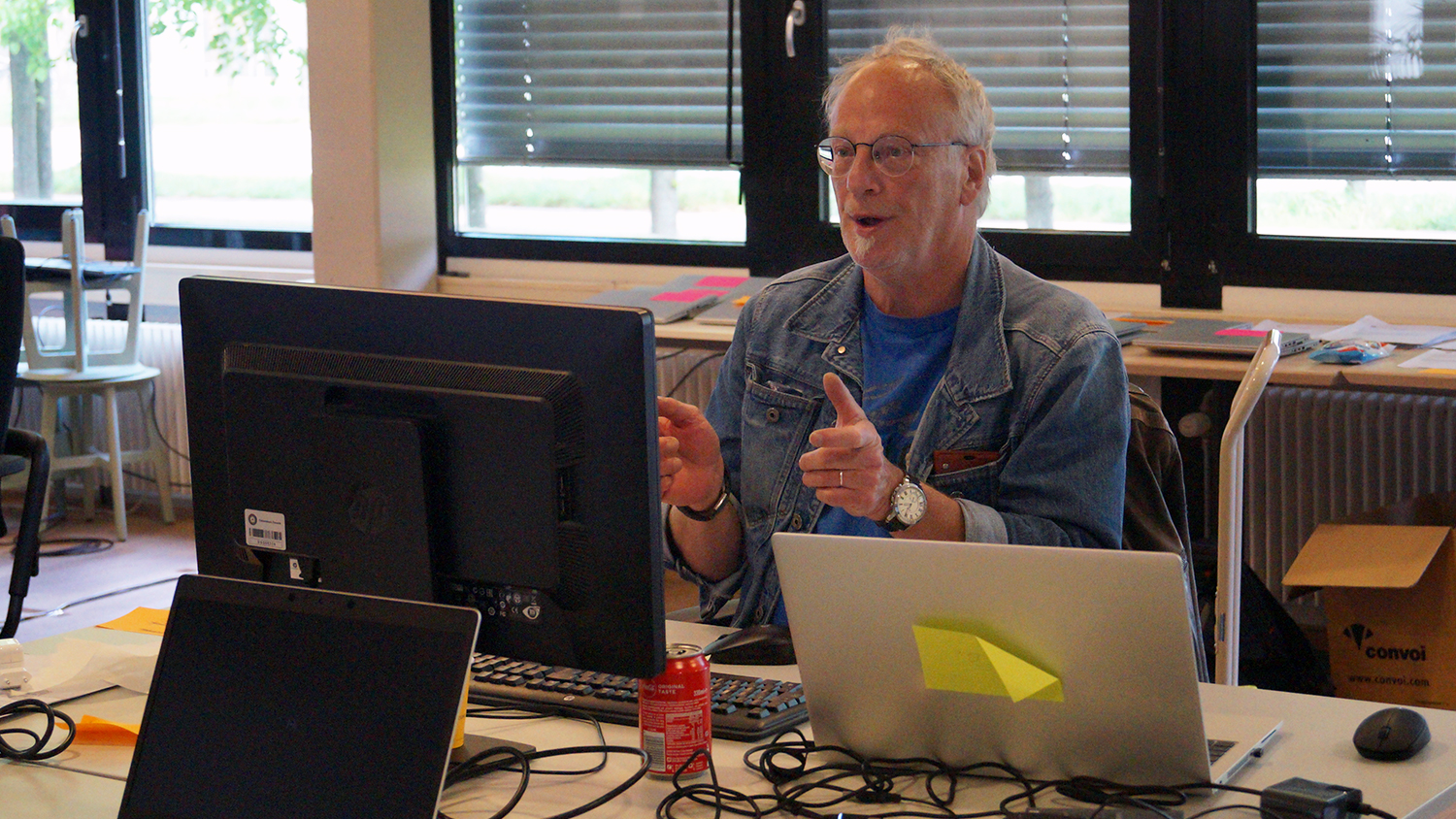
What type of work do you do?
“I’m a local support officer. That means I help people with IT issues when it’s not possible to solve them remotely. Usually, people call the helpdesk first. If they’re still stuck, they’re referred to us. We help people in both De Uithof and the city centre.”
How different is your work now compared to normal times?
“I can’t help people at their workplaces now. So now, I spend five days a week working at an emergency desk we set up in the lobby of the Administration Building, with my colleague Erwin Jens. People can stop by if the phone helpdesk hasn’t solved their problems. We also issue laptops here for people who work from home and didn’t have one yet. When they stop by, we help them install all the programmes they need. These past weeks, we ordered around 500 extra laptops. For the university, there’s a boost in terms of remote working. We had three hundred VPN connections; that was increased to 10,300 connections this month. It’s amazing that so much is going well when before corona, it wouldn’t have gone quite so smoothly. We’re really making great strides in digitisation.”
What would happen if no one was here?
“You need a place where you can hand out equipment to employees. With a new laptop, for instance, the first time you log in has to be within the university. Only then will it be possible to use it from home. Other equipment related to digitisation can also be ordered through us.”
How does it feel to be here, and what do you do to stay safe from corona?
“I think it’s amazing that I get to work here. It’s great for my discipline. You still get to talk to quite a number of colleagues who are here as well. Security is here, cleaners are very active. And it’s great to be able to help people personally, with a new laptop and all necessary software, for instance. I have to be careful though, as I’m in the high-risk group. That’s why we’re always in the same team of two people. We have double desks everywhere to keep our distance. We use gloves, and there’s always hand sanitiser nearby.”
Jan Willem Doelman (31), Maintenance Engineer
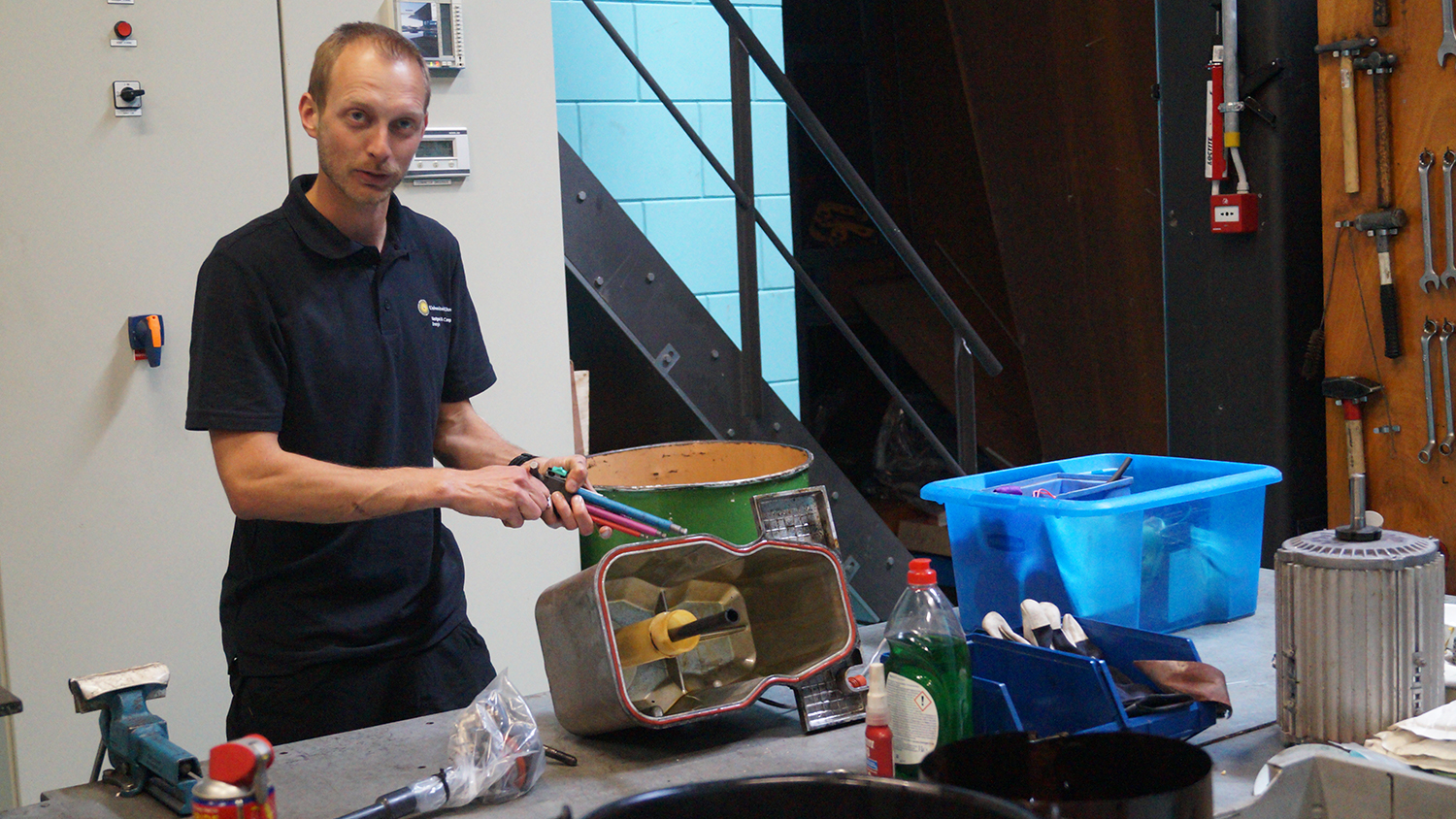
What type of work do you do?
“I’m an operator in the UU cogeneration plant. That’s the big, rusty iron building behind Veterinary Medicine. With six gas-powered turbines, we heat water to 120 degrees Celsius, and every day from 7am, we pump that to all the buildings at the Utrecht Science Park and back. We also have generating sets that produce electricity. But the heating is our primary task. As operator, you have to keep an eye on the process, maintain the machines, and repair things when needed. This morning, we did maintenance on one of the turbines, and just now, one of them has stalled. We will probably have to replace a part.”
How different is your work now compared to normal times?
“We usually work with a team of four people; now, there’s just two. We also see there’s less demand for heating – although that’s also weather-related. When the weather’s warm, we run two turbines; when it’s rainy and cold, that number instantly increases. We also don’t see our colleagues from the energy team anymore, who are usually stationed in the Administration Building.”
What would happen if no one was here?
“I believe there was a moment when they considered to keep an eye on the machines remotely, like we do at nights and in the weekends. In that scenario, one of us would be on call. But that won’t work for longer periods. You have to keep a close eye on things here, and there’s always something that needs to be maintained or repaired. If that doesn’t happen, the machines will stall quite quickly.”
How does it feel to be here, and what do you do to stay safe from corona?
“I understand the measures, but I’m happy I can still work here. There’s plenty to do. I’m not afraid of corona. I’m not in the high-risk group, and this is such a remote corner that we don’t see many others.”
Ronit Rosenberg (22), receptionist at University College Utrecht
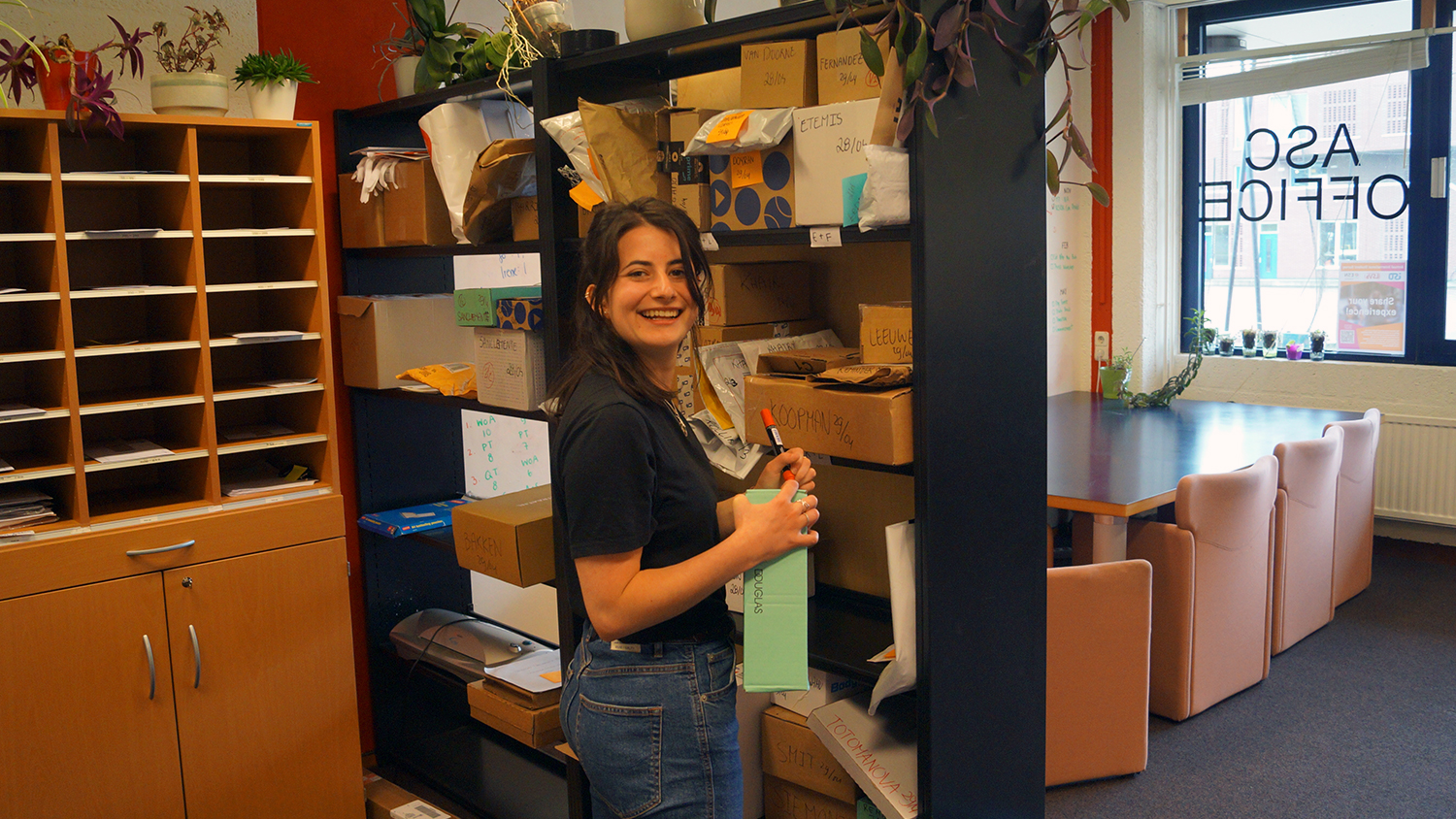
What type of work do you do?
“We’re the contact point for everyone who wants to contact University College from outside the university. We check the incoming emails, answer the phone, and help the students on campus when they have questions. We refer everyone to the right person for their questions. We also process all the incoming mail. We have a team of ten students, and each one works around four hours a week. I myself am a third-year UCU student.”
How different is your work now compared to normal times?
“We usually work in College Hall, but as most buildings had to close, we moved to the Dining Hall. We reduced our opening hours a little. And an important new task is to bring packages to students. Everything comes in here; we send students an email, and they pick it up. We’ve got a huge pile here.”
What would happen if no one was here?
“It would be annoying if there was no contact point on campus at all. Moreover, it’s possible there are valuable things in the mail, such as diplomas of prospective students. We scan those and make sure they don’t get lost.”
How does it feel to be here, and what do you do to stay safe from corona?
“I’m very happy to work here. I live here on campus, and you notice that you don’t see other students nearly as often. At least now, I have some contact. To prevent corona, we do keep our distance. The table is at 1.5 metre’s distance, and students don’t enter the room. We also ask the students to bring their own pen to sign for their packages.”
Marianne Wikart (58), public service officer University Library city centre
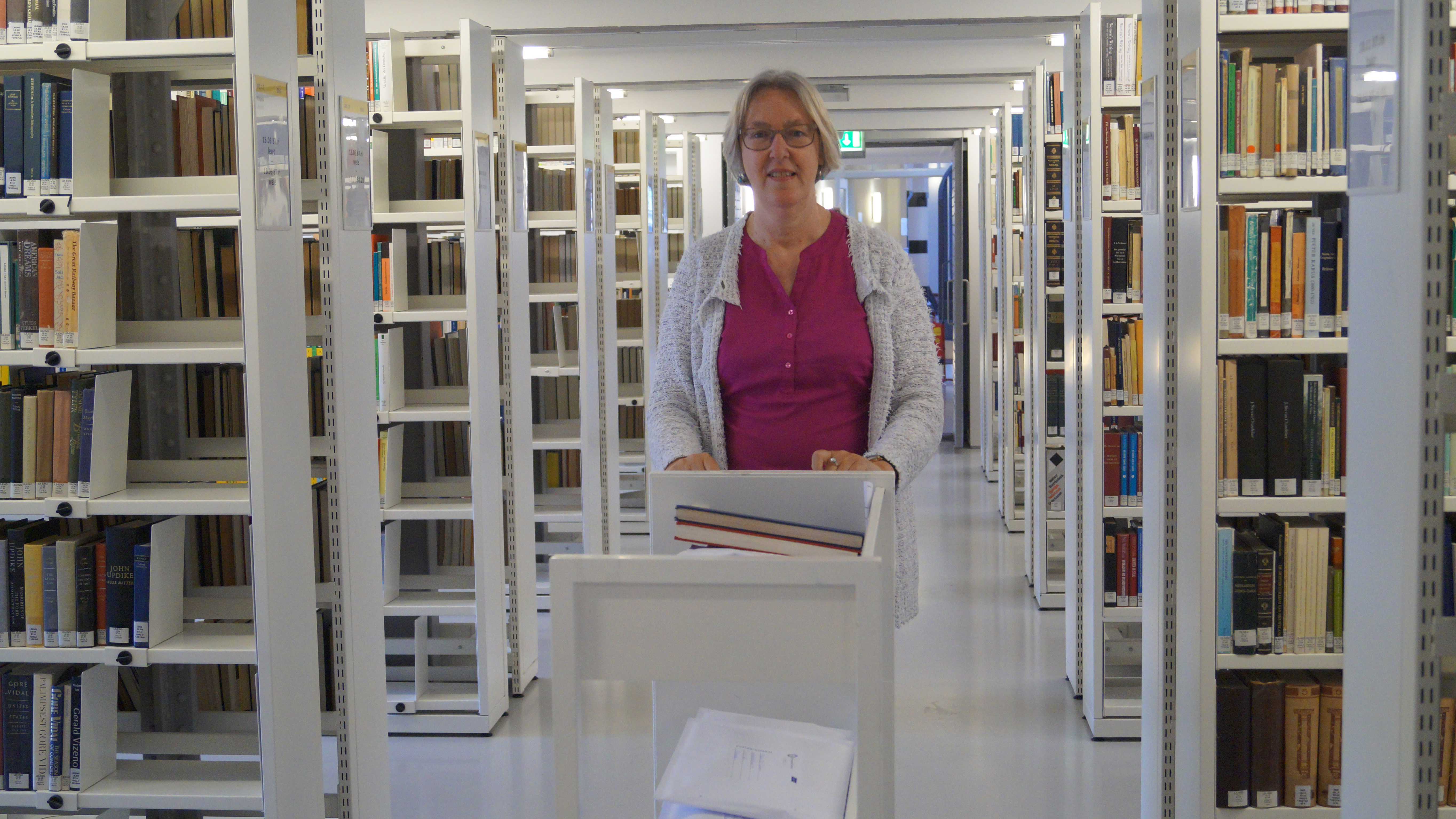
What type of work do you do?
“I work for public service. As public service officer, I’m in direct contact with the visitors of the University Library. I man the service desk, for instance. There, we help people with all kinds of questions, from where they can find a certain book to questions about library cards, guest accounts, printing, and log in issues. We also have desk services; during these shifts, we answer phone calls and emails, and we handle inter-library loans. Another task is preparing binding and making class shelves for books students need for a certain course. This is just a sample of the tasks the public service does.”
How different is your work now compared to normal times?
“The service we can offer now is very limited, it’s more of an emergency service. Students and employees can fill out a form via email to request to loan a book or scan a text. We print the requests, find the books, and send them to the mailroom. From there, the books are sent to the people at home. So instead of having people come in to pick up their books, we now send them to their homes. We’ve also suspended our late fee system. We send scans of a few pages at a time ourselves, via email; larger scans are done at the University Library in De Uithof.”
What would happen if no one was here?
“That would be very inconvenient for many employees and students. They wouldn’t be able to continue with their studies, research, education, or writing their theses. You can tell from all the thank you messages we receive. People are very happy that this service exists.”
How does it feel to be here, and what do you do to stay safe from corona?
“I’m almost entirely on my own here in the library. That’s such a strange experience. I thought it’d be creepy to be by myself in such a large, deserted building, but it’s not. Of course, security and the cleaners are also here. I’m happy I can work. I’ve been here for so long, that I’ve built a connection with the beautiful building and the collections. It’s a shame that we have to work alone. I miss talking to colleagues, and with visitors. Inside the building, I’m not really afraid of corona. I travel by bus and train, and that worries me more, especially when more people will start to commute again.”